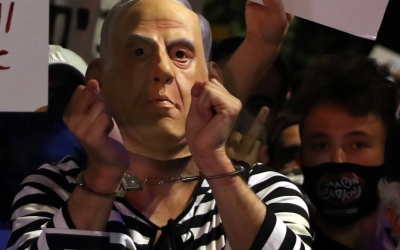Why Israel's anti-Netanyahu protests will not change the system

The protests against Prime Minister Benjamin Netanyahu that have erupted in Israel in recent months highlight the multiple impasses defining the country’s society and government. Chief among these are corruption, the electoral stalemate and the coronavirus pandemic, which have all exacerbated Israel’s economic crisis.
Yet, even as Israelis have staged unprecedented anti-Netanyahu demonstrations, polls have simultaneously shown a rise in the popularity of the far-right Yamina alliance, led by Naftali Bennett, at the expense of Likud. This surge raises a number of questions, chiefly: how can we reconcile the rise of far-right politics with the rise of mass protests focused on ending corruption and economic inequality?
If the problem is Netanyahu, then Naftali Bennett becomes an option to lead Israel
To answer this question, I refer to the work of the late Israeli political theorist Zeev Sternhell, who has explored the political strategies of the Israeli right and left. Today, the main demand of protesters is the departure of Netanyahu - which shows the limitations of the movement, as such a development would leave intact the overall structure of the Zionist regime, which has been in place for decades.
In a piece for Le Monde Diplomatique in 2009, Sternhell wrote: “The Israeli left is impotent, without an ideology to offer a way out of the mire of neocolonialism and neoliberalism. This was as clear in this February’s electoral debacle as it was in the historic defeat of 1977, when the right took power for the first time. Many Israelis realise they are witnessing the steady decline, if not the death, of the left.”
This explains the lack of real opposition and alternatives to emerge during the recent protests. While these neoliberal policies began with the right, the “traditional left” (including Labor, whose values I don’t consider to be leftist) has also adopted them to preserve the domination of the Ashkenazi class it represents. This has allowed for the accumulation of corporate power in Israel, in exchange for the decline of state sovereignty.
New MEE newsletter: Jerusalem Dispatch
Sign up to get the latest insights and analysis on Israel-Palestine, alongside Turkey Unpacked and other MEE newsletters
Today, the traditional Israeli left has disappeared, leaving only right-wing political options.
'A serious mistake'
Since Israel’s occupation of Arab lands, particularly what remained of historical Palestine in 1967, divisions within Israeli society have fuelled the rise of right-wing political parties.
The right has offered a decisive alternative to the traditional left, including a commitment to sovereignty over the entire “Land of Israel”. The right-wing structure of the state has become difficult to compete with.
Mtanes Shehadeh, head of the Balad faction of the Joint List, criticised the recent protests in a Haaretz article, noting: “A serious mistake has been made in recent weeks and months by protest organisers against Prime Minister Benjamin Netanyahu: they are focusing on overthrowing the corrupt from Balfour and on the ‘right to demonstrate’ as the main targets.”
He pointed out that the protesters have not confronted other acute questions on the essence of the Israeli regime, thus hindering the establishment of a broad front against all forms of racism, inequality, occupation and settlement - a front that would include Palestinians, breaking the boundaries of Israel’s Zionist consensus.
Traditional methods
What is remarkable is that, as described by Shehadeh, this mistake will ultimately strengthen right-wing extremists. If the problem is Netanyahu, then Bennett becomes an option to lead Israel. Religious, right-wing and a solid supporter of settlers in the occupied West Bank, Bennett speaks fluent English with a perfect American accent. For the Israeli centre - the country’s majority - that’s just fine.
The protests have ultimately left a political vacuum. They had the potential to engage with the capitalist, colonial regime and motivate its rooted leaders. Instead, they relied on traditional political methods dominated by right-wing rhetoric.
The views expressed in this article belong to the author and do not necessarily reflect the editorial policy of Middle East Eye.
Middle East Eye delivers independent and unrivalled coverage and analysis of the Middle East, North Africa and beyond. To learn more about republishing this content and the associated fees, please fill out this form. More about MEE can be found here.






